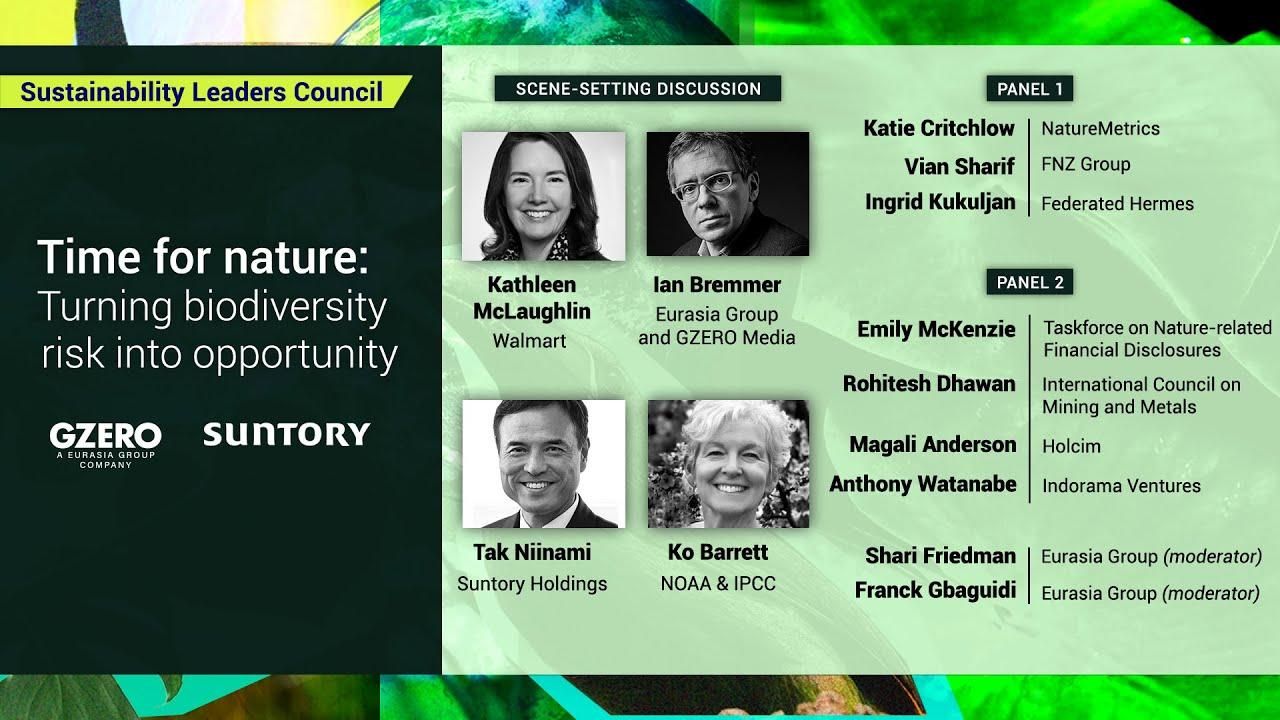
The world has been in a climate emergency for years now. But much less attention is paid to biodiversity loss — which is a very big deal since we're on the brink of a sixth mass extinction.
On the heels of the ongoing COP15 UN Biodiversity Conference in Montreal, Canada, we gathered experts from the public and private sectors to discuss the gravity of the problem and, more importantly, how to fix it. The solution lies with businesses, although it needs help from policymakers to figure out how to make money in a sustainable way that not only protects life on earth but actually reverses the course of its destruction.
Here are a few highlights from "Time for nature: Turning biodiversity risk into opportunity," a livestream conversation hosted by GZERO in partnership with Suntory.
Ko Barrett, vice chair of the Intergovernmental Panel on Climate Change and senior adviser for climate at NOAA, offers a primer on the importance of biodiversity to human life and explains why we can't solve climate change without addressing biodiversity loss simultaneously.
Eurasia Group President Ian Bremmer delves into the geopolitics of biodiversity as an economic issue and identifies the three types of risk companies face from biodiversity loss.
Suntory CEO Tak Niinami gives his take on why companies should do more to coexist with nature long-term and share their know-how to reverse biodiversity destruction.
Kathleen McLaughlin, Walmart's executive VP and chief sustainability officer, shares how retailers can work not only to conserve but also protect nature with successful examples from Walmart's Project Gigaton.
Ingrid Kukuljan, head of Impact & Sustainable Investing at Federated Hermes, laments how investors have ignored nature despite the many opportunities in public markets and dismisses metrics as the big obstacle to mobilizing more money for biodiversity.
FNZ Group sustainability chief Vian Sharif addresses greenwashing related to biodiversity and admits that the financial sector is only at the beginning of its nature-positive journey.
NatureMetrics CEO Katie Critchlow explains how her company "measures nature," which many people are not aware can actually be done.
International Council on Mining and Metals CEO Rohitesh “Ro” Dhawan shares how even extractive companies can have a positive impact on biodiversity via conservation, restoration, and data, and want governments to be more ambitious on this issue.
Magali Anderson, Holcim's chief sustainability and innovation officer, says that the world's biggest cement company wants two things from COP15: a framework for corporations and a commitment to reverse biodiversity loss by 2030.
Taskforce on Nature-related Financial Disclosures technical director Emily McKenzie comments on why markets are ready to take action on biodiversity and gives an update on what's cooking with the TNFD.
Anthony Watanabe, chief sustainability officer at Indorama, gives a rundown of what his company is doing on nature-positive.- Fixing climate in Asia… and recycling its plastics too ›
- COP15 biodiversity wish list for the private sector ›
- COP27 winners and losers ›
- What to expect from COP27: “It’s pretty grim” ›
- How do financial disclosures help protect biodiversity? - GZERO Media ›
- 3 ways mining companies can help protect biodiversity - GZERO Media ›